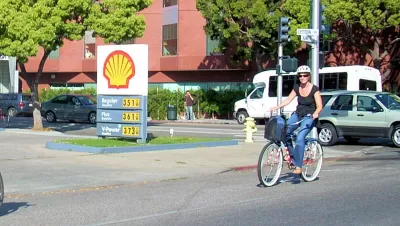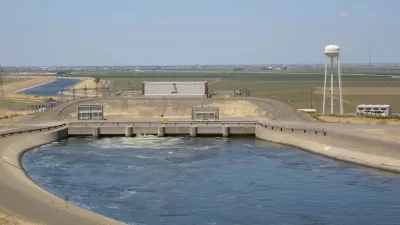The oil industry was predicting motorist outrage and an increase in gas prices of around 70-cents due to the carbon charge effective in the state on January 1. Some prices increased 10-cents, but went largely unnoticed.

The so-called ''hidden gas tax," a term concocted by the oil industry and others opposed to transportation fuels entering the nation's most far-reaching cap-and-trade market, is, in fact, a wholesale charge paid by fuel suppliers required to purchase carbon allowances from the California Air Resources Board (CARB). Oil refineries, power plants, and other large carbon emitters have been under cap-and-trade since compliance began in 2013.
"Last year, as retail prices hit $4.30 a gallon, oil-industry trade groups warned the [carbon] fee was a 'hidden tax' that could add 70 cents a gallon or more," writes Dan McSwain, business columnist for U-T San Diego. "However, this week the fee added just 10 cents a gallon to wholesale costs, based on November auction prices in the state’s 'cap-and-trade' market that sets the fee." That's exactly what University of California, Berkeley energy economist, Severin Borenstein, predicted here in August.
All things considered, it’s clearly not going be a fuel apocalypse,” said Tom Kloza, global head of energy analysis for Oil Price Information Service, which is based in Gaithersburg, Md.
In fact, according to the "(n)ational gas price tracker GasBuddy.com, the average retail price of gas in California on (Jan. 02) was $2.64 a gallon, up 2 cents from New Year’s Day," writes Marks Glover of The Sacramento Bee.
Unlike the state excise tax which funds the Highway Users Account (per Article 19, 1970), carbon charges, along with other cap-and-trade auction proceeds, will be applied to projects that reduce greenhouse gas (GHG) emissions. According to CARB:
The Legislature and Governor appropriate proceeds from the sale of State-owned allowances for projects that support the goals of AB 32. Strategic investment of these proceeds furthers the goals of AB 32 by reducing GHG emissions, providing net GHG sequestration, and supporting the long-term, transformative efforts needed to improve public and environmental health and develop a clean energy economy.
See "Calif. Governor Signs Game-Changing Budget for HSR, Transit, and Affordable Housing," for information on how these funds will be spent. Consequently, "the deferred maintenance on our roads" that Gov. Jerry Brown referenced in his Jan. 05 Inaugural Address will see no improvement despite the expected 10-cents additional charge to gas prices.
FULL STORY: Cheap oil hides global-warming fee, for now

Alabama: Trump Terminates Settlements for Black Communities Harmed By Raw Sewage
Trump deemed the landmark civil rights agreement “illegal DEI and environmental justice policy.”

Study: Maui’s Plan to Convert Vacation Rentals to Long-Term Housing Could Cause Nearly $1 Billion Economic Loss
The plan would reduce visitor accommodation by 25% resulting in 1,900 jobs lost.

Why Should We Subsidize Public Transportation?
Many public transit agencies face financial stress due to rising costs, declining fare revenue, and declining subsidies. Transit advocates must provide a strong business case for increasing public transit funding.

Paris Bike Boom Leads to Steep Drop in Air Pollution
The French city’s air quality has improved dramatically in the past 20 years, coinciding with a growth in cycling.

Why Housing Costs More to Build in California Than in Texas
Hard costs like labor and materials combined with ‘soft’ costs such as permitting make building in the San Francisco Bay Area almost three times as costly as in Texas cities.

San Diego County Sees a Rise in Urban Coyotes
San Diego County experiences a rise in urban coyotes, as sightings become prevalent throughout its urban neighbourhoods and surrounding areas.
Urban Design for Planners 1: Software Tools
This six-course series explores essential urban design concepts using open source software and equips planners with the tools they need to participate fully in the urban design process.
Planning for Universal Design
Learn the tools for implementing Universal Design in planning regulations.
Smith Gee Studio
Alamo Area Metropolitan Planning Organization
City of Santa Clarita
Institute for Housing and Urban Development Studies (IHS)
City of Grandview
Harvard GSD Executive Education
Toledo-Lucas County Plan Commissions
Salt Lake City
NYU Wagner Graduate School of Public Service




























